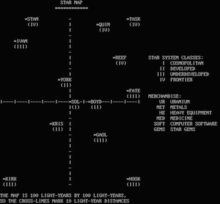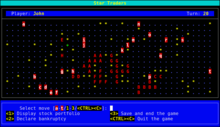Star Trader
Star Trader is a 1974 video game and an early example of the space trading genre. The game involves a single player moving from star to star on a map of the galaxy, buying and selling quantities of six types of merchandise in order to make money. The game was developed by Dave Kaufman for computers in 1973, and its BASIC source code was printed in the January 1974 issue of the People's Computer Company Newsletter. It was reprinted in the 1977 book What to Do After You Hit Return. The game was the inspiration for the multiplayer Trade Wars series, beginning in 1984, and is through that series the antecedent to much of the space trading genre.
| Star Trader | |
|---|---|
| Developer(s) | Dave Kaufman |
| Platform(s) | Computer |
| Release | January 1974 |
| Genre(s) | Space trading |
Gameplay

Star Trader is a single-player space trading game, in which the player trades resources between star systems in order to make money. The game presents a star map of the galaxy in which the player moves about and makes money from trading and establishing trading routes. The player travels from node to node on the star map buying and selling six types of merchandise: uranium, metals, gems, software, heavy equipment, and medicine. The game's interface is text-only.
Development
Star Trader was written by Dave Kaufman in the BASIC programming language. The source code to the game was published by in the People's Computer Company Newsletter in volume 2, issue 3 in January 1974. The concept for the game is seemingly based on Isaac Asimov's Foundation series of novels.
Legacy
In 1977, the game's code was reprinted in What to Do After You Hit Return.[1] Star Trader was used as the inspiration for the first game of the Trade Wars series of multiplayer space trading games in 1984, making it the ancestor of many subsequent space trader games, including Eve Online, the Wing Commander Privateer series and Elite series.[2][3]

Several unrelated but similar space trading games have been released under the name Star Trader. One such game was released by Bug Byte Software in 1984 for the ZX Spectrum and Commodore 64,[4] and was one of the games included with the Softaid compilation. Another was written by S. J. Singer in 1984 using Altair Basic, and modified by John Zaitseff for Microsoft Basic under the CP/M-80 operating system in 1988. Completely rewritten versions for CP/M-80, CP/M-86, MS-DOS, Microsoft Windows 3.1 and Linux/Unix followed, with the latest release for Linux and Unix occurring in November 2019.[5] All versions by John Zaitseff have been released or relicensed under the GNU General Public License v3.
References
- What to Do After You Hit Return. Hayden Book Company. 1977. ISBN 0-8104-5476-9.
- Edwards, Benj (February 8, 2009). "The Ten Greatest PC Games Ever". PC World. Retrieved 2010-01-03.
- Tringham, Neal Roger (2014-09-10). Science Fiction Video Games. CRC Press. p. 212. ISBN 978-1-4822-0389-9.
- Star Trader on MobyGames
- Zaitseff, John (November 13, 2019). "Star Traders". Retrieved 2020-01-02.
External links
- The People's Computer Company Alumni Pages People's Computer Company Alumni and History site.
- Standard HP BASIC Listing #1 Star Trader Game Setup Module BASIC programming language listing.
- Standard HP BASIC Listing #2 Star Trader Game Main Module BASIC programming language listing.
- Star Trader Tribute Page Site describing the history of Star Trader.
- History Of Trade Wars Variants Timeline of the history of Trade Wars variants.
- Star Traders Versions of Star Traders for Linux, as well as for CP/M-80, CP/M-86, MS-DOS, Windows 3.1 and Commodore 64.